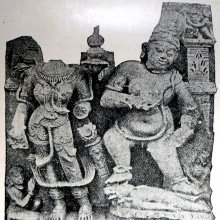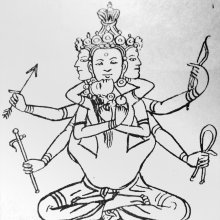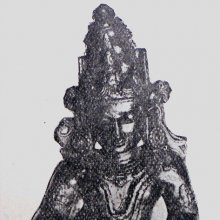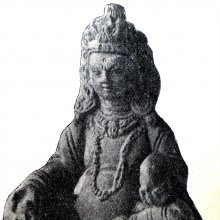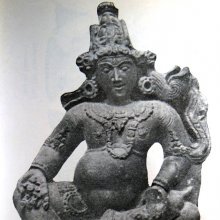Dimbha, Ḍimbha: 13 definitions
Introduction:
Dimbha means something in Buddhism, Pali, Hinduism, Sanskrit, Jainism, Prakrit, Hindi. If you want to know the exact meaning, history, etymology or English translation of this term then check out the descriptions on this page. Add your comment or reference to a book if you want to contribute to this summary article.
Images (photo gallery)
In Hinduism
Jyotisha (astronomy and astrology)
Source: Wisdom Library: Brihat Samhita by VarahamihiraḌimbha (डिम्भ) refers to an “infant” (i.e., “young children”), according to the Bṛhatsaṃhitā (chapter 16) (“On the planets—graha-bhaktiyoga”), an encyclopedic Sanskrit work written by Varāhamihira mainly focusing on the science of ancient Indian astronomy astronomy (Jyotiṣa).—Accordingly, “[...] Mars presides over citizens, farmers, chemists, firemen, soldiers, forest-men, citadels, chief towns, butchers, sinners, haughty men, kings, children, elephants, fops, infanticides (ḍimbha-abhighāta), shepherds, red fruits, red flowers, corals, commanders of armies, jaggery, wine, cruel men, storehouses, Agnihotrins, metal mines, the Śākyas in red robes, the Buddhists, thieves, rogues, vindictive and gluttonous persons. [...]”.

Jyotisha (ज्योतिष, jyotiṣa or jyotish) refers to ‘astronomy’ or “Vedic astrology” and represents the fifth of the six Vedangas (additional sciences to be studied along with the Vedas). Jyotisha concerns itself with the study and prediction of the movements of celestial bodies, in order to calculate the auspicious time for rituals and ceremonies.
In Buddhism
Tibetan Buddhism (Vajrayana or tantric Buddhism)
Source: archive.org: The Indian Buddhist IconographyḌimbha (डिम्भ) is another name for Ucchuṣma: one of the various emanations of Akṣobhya having their Sādhana described in the 5th-century Sādhanamālā (a collection of sādhana texts that contain detailed instructions for rituals).—His Appearance is terrible; his Vāhana is Kuvera vomitting jewels; his Āsana is the pratyālīḍha.—Ucchuṣma also called Ḍimbha, being a variety of Jambhala, bears also the image of Akṣobhya on his crown. He may however, have the image of Ratnasambhava instead, and as an emanation of Ratnasambhava Jambhala will be described later. Several Sādhanas are devoted to his worship.

Tibetan Buddhism includes schools such as Nyingma, Kadampa, Kagyu and Gelug. Their primary canon of literature is divided in two broad categories: The Kangyur, which consists of Buddha’s words, and the Tengyur, which includes commentaries from various sources. Esotericism and tantra techniques (vajrayāna) are collected indepently.
Languages of India and abroad
Sanskrit dictionary
Source: DDSA: The practical Sanskrit-English dictionaryḌimbha (डिम्भ).—
1) A young child; रे रे ब्राह्मणडिम्भ (re re brāhmaṇaḍimbha) Mālatīmādhava (Bombay) 5.28/29.
2) Any young animal such as a cub; जृम्भस्व रे डिम्भ दन्तांस्ते गणयिष्यामि (jṛmbhasva re ḍimbha dantāṃste gaṇayiṣyāmi) Ś.7.
3) A fool, a block-head.
4) A young shoot. पलालजालैः पिहितः स्वयं हि प्रकाशमासादयतीक्षु- डिम्भः (palālajālaiḥ pihitaḥ svayaṃ hi prakāśamāsādayatīkṣu- ḍimbhaḥ) N.8.2.
-bhā An infant.
Derivable forms: ḍimbhaḥ (डिम्भः).
Source: Cologne Digital Sanskrit Dictionaries: Benfey Sanskrit-English DictionaryḌimbha (डिम्भ).—m. and f. bhā, A child, [Śākuntala, (ed. Böhtlingk.)] p. 103, 11 ([Prakrit]).
Source: Cologne Digital Sanskrit Dictionaries: Cappeller Sanskrit-English DictionaryḌimbha (डिम्भ).—[masculine] a new-born child, fool, ignorant; young animal, sprout of a plant; egg, globe.
Source: Cologne Digital Sanskrit Dictionaries: Monier-Williams Sanskrit-English Dictionary1) Ḍimbha (डिम्भ):—m. (cf. mba) a new-born child, child, boy, young animal, [Śakuntalā; Hāla; Naiṣadha-carita; Bālarāmāyaṇa; Pañcarātra; Śāṅkhāyana-gṛhya-sūtra [Scholiast or Commentator]]
2) an idiot, [Mālatīmādhava; Sāhitya-darpaṇa]
3) a young shoot, [Naiṣadha-carita viii, 2]
4) an egg, [Pañcarātra]
5) Name of a Dānava, [Harivaṃśa ii, 102, 10]
6) Ḍimbhā (डिम्भा):—[from ḍimbha] f. an infant, [cf. Lexicographers, esp. such as amarasiṃha, halāyudha, hemacandra, etc.]
7) Ḍimbha (डिम्भ):—cf. toya-.
Source: Cologne Digital Sanskrit Dictionaries: Yates Sanskrit-English DictionaryḌimbha (डिम्भ):—(mbhaḥ) 1. m. Any young animal; an egg; a fool. f. An infant.
Source: DDSA: Paia-sadda-mahannavo; a comprehensive Prakrit Hindi dictionary (S)Ḍimbha (डिम्भ) in the Sanskrit language is related to the Prakrit word: Ḍiṃbha.
[Sanskrit to German]
Sanskrit, also spelled संस्कृतम् (saṃskṛtam), is an ancient language of India commonly seen as the grandmother of the Indo-European language family (even English!). Closely allied with Prakrit and Pali, Sanskrit is more exhaustive in both grammar and terms and has the most extensive collection of literature in the world, greatly surpassing its sister-languages Greek and Latin.
Hindi dictionary
Source: DDSA: A practical Hindi-English dictionaryḌiṃbha (डिंभ):—(nm) a larva.
...
Prakrit-English dictionary
Source: DDSA: Paia-sadda-mahannavo; a comprehensive Prakrit Hindi dictionary1) Ḍiṃbha (डिंभ) in the Prakrit language is related to the Sanskrit word: Sraṃs.
2) Ḍiṃbha (डिंभ) also relates to the Sanskrit word: Ḍimbha.
Prakrit is an ancient language closely associated with both Pali and Sanskrit. Jain literature is often composed in this language or sub-dialects, such as the Agamas and their commentaries which are written in Ardhamagadhi and Maharashtri Prakrit. The earliest extant texts can be dated to as early as the 4th century BCE although core portions might be older.
Kannada-English dictionary
Source: Alar: Kannada-English corpusḌiṃbha (ಡಿಂಭ):—
1) [noun] = ಡಿಂಬ [dimba]2 - 1.
2) [noun] a newly born child or a newly born animal.
3) [noun] a man lacking ordinary quickness and keenness of mind; a stupid fellow.
4) [noun] the uterus of the human female; the womb.
Kannada is a Dravidian language (as opposed to the Indo-European language family) mainly spoken in the southwestern region of India.
See also (Relevant definitions)
Starts with: Dimbhabhighata, Dimbhacakra, Dimbhachakra, Dimbhadimbha, Dimbhaka, Dimbhalila.
Ends with: Brahmanadimbha, Cutadimbha, Dimbhadimbha, Ikshudimbha, Toyadimbha.
Full-text: Toyadimbha, Dimbhacakra, Dimbhaka, Toyadimba, Dimbh, Srams, Nimi, Dimbhadimbha, Ikshudimbha, Brahmanadimbha, Dimba, Abhighata, Ucchushmajambhala, Ucchushma, Sarshapa.
Relevant text
Search found 9 books and stories containing Dimbha, Ḍimbha, Ḍimbhā, Ḍiṃbha; (plurals include: Dimbhas, Ḍimbhas, Ḍimbhās, Ḍiṃbhas). You can also click to the full overview containing English textual excerpts. Below are direct links for the most relevant articles:
Garga Samhita (English) (by Danavir Goswami)
Verse 1.6.34 < [Chapter 6 - Description of Kaṃsa’s Strength]
The Indian Buddhist Iconography (by Benoytosh Bhattachacharyya)
Figure 130 - Emanations of Akṣobhya: Ucchuṣma-Jambhala
Bhakti-rasamrta-sindhu (by Śrīla Rūpa Gosvāmī)
Verse 3.4.30 < [Part 4 - Parenthood (vātsalya-rasa)]
Verse 2.4.49 < [Part 4 - Transient Ecstatic Disturbances (vyābhicāri-bhāva)]
Sahitya-kaumudi by Baladeva Vidyabhushana (by Gaurapada Dāsa)
Text 10.76 < [Chapter 10 - Ornaments of Meaning]
Text 10.134 [Svabhāvokti] < [Chapter 10 - Ornaments of Meaning]
Text 10.136 < [Chapter 10 - Ornaments of Meaning]
Trishashti Shalaka Purusha Caritra (by Helen M. Johnson)
Part 38: Rescue of Nandiṣeṇā < [Chapter II - Marriages of Vasudeva with maidens]
Yoga Vasistha [English], Volume 1-4 (by Vihari-Lala Mitra)
Chapter XXVIII - Description of bali’s anaesthesia < [Book V - Upasama khanda (upashama khanda)]
